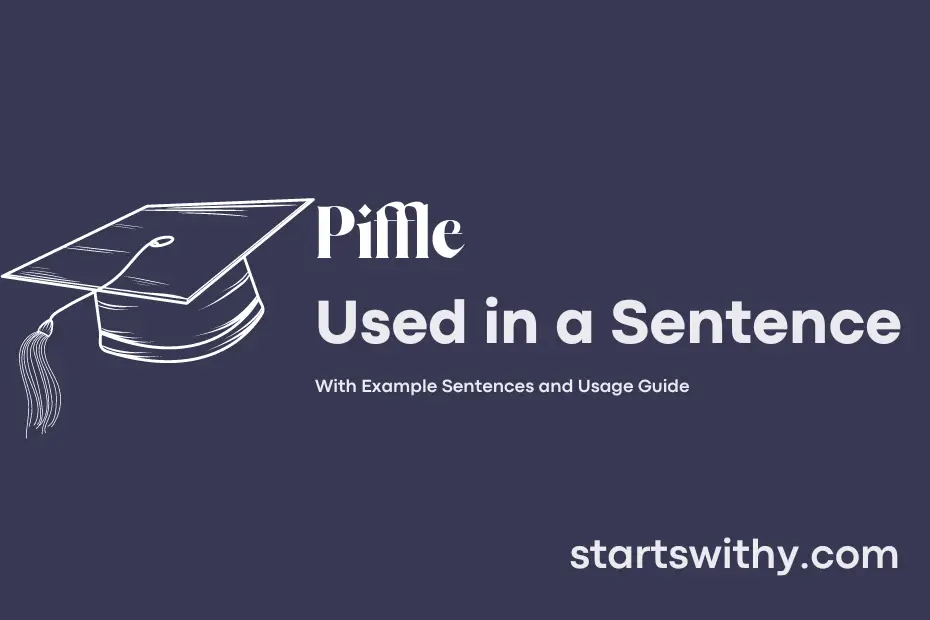Have you ever come across the word “piffle” and wondered what it means? In simple terms, “piffle” is a term used to dismiss something as nonsense or unworthy of serious consideration. It’s often used to express disbelief or convey the idea that something is trivial or irrelevant.
When someone calls out “piffle,” they are essentially saying that they find the statement or idea to be ridiculous, unimportant, or nonsensical. It’s a lighthearted and somewhat old-fashioned way of expressing skepticism or a lack of belief in what has been said. So, the next time you hear someone use the word “piffle,” you can rest assured that they are not taking the matter very seriously.
7 Examples Of Piffle Used In a Sentence For Kids
- Piffle is a funny word to say.
- I don’t believe that’s true, it’s just piffle!
- Let’s not listen to all that piffle.
- The silly rabbit said a whole lot of piffle.
- It’s fun to giggle at piffle.
- When someone tells a fib, it’s just piffle.
- Piffle is like a make-believe word.
14 Sentences with Piffle Examples
- It’s all just a bunch of piffle; I can’t believe the professor expects us to memorize all these random facts.
- Don’t listen to their piffle; focus on your own studies and goals.
- I can’t be bothered with their pointless piffle about who got the highest grades in the class.
- Let’s not waste time on their piffle; we have a deadline to meet for our group project.
- The seniors were talking a lot of piffle about which professors to avoid for certain courses.
- I’m tired of listening to the same old piffle from the know-it-all in our class.
- Instead of engaging in meaningless piffle, let’s discuss how we can improve our grades together.
- He kept spouting piffle about how he aced the exam without even studying.
- I wish we had a study group where we could all help each other out instead of hearing piffle from people who don’t want to contribute.
- Let’s put an end to this pointless piffle and focus on our career aspirations.
- The gossip circulating around campus is nothing but piffle meant to distract us from studying.
- Pay no mind to their piffle about who got into which university; we all have our own paths to follow.
- I don’t have time for their empty piffle about skipping classes to party – education is important to me.
- We should ignore their piffle about who’s dating whom and concentrate on our academic pursuits.
How To Use Piffle in Sentences?
To use the word Piffle in a sentence, you can follow these steps. First, identify a situation that involves trivial or meaningless talk or activities. For example, “Stop Piffling around and focus on your homework.” Secondly, understand that Piffle is commonly used to describe actions or conversations that lack importance or significance. You can say, “I don’t have time for your Piffle; we need to discuss the project details.” Furthermore, keep in mind that Piffle is often employed when someone is seen as wasting time or engaging in unimportant matters. As in, “Her constant Piffling about irrelevant topics is starting to annoy me.” Lastly, remember that Piffle can also be used in a lighthearted or playful manner to gently tease someone about their trivial behavior. For instance, “Oh, don’t listen to him, he’s just Piffling as usual.” By incorporating the term Piffle into your vocabulary, you can add a touch of humor or criticism to your conversations in a light-hearted and engaging way.
Conclusion
In conclusion, sentences filled with piffle are devoid of substance, often consisting of meaningless or trivial words that add no value to the communication at hand. These sentences are typically seen as frivolous, unimportant, or simply a waste of time for the reader or listener. While piffle can sometimes be used for comedic effect or light-hearted banter, it is important to strike a balance to ensure effective and meaningful communication.
By minimizing the use of piffle in our sentences, we can convey our messages more clearly and concisely, leading to better understanding and engagement with our audience. It is crucial to strive for clarity and coherence in our sentences, avoiding unnecessary fluff or filler words that ultimately detract from the intended message.



